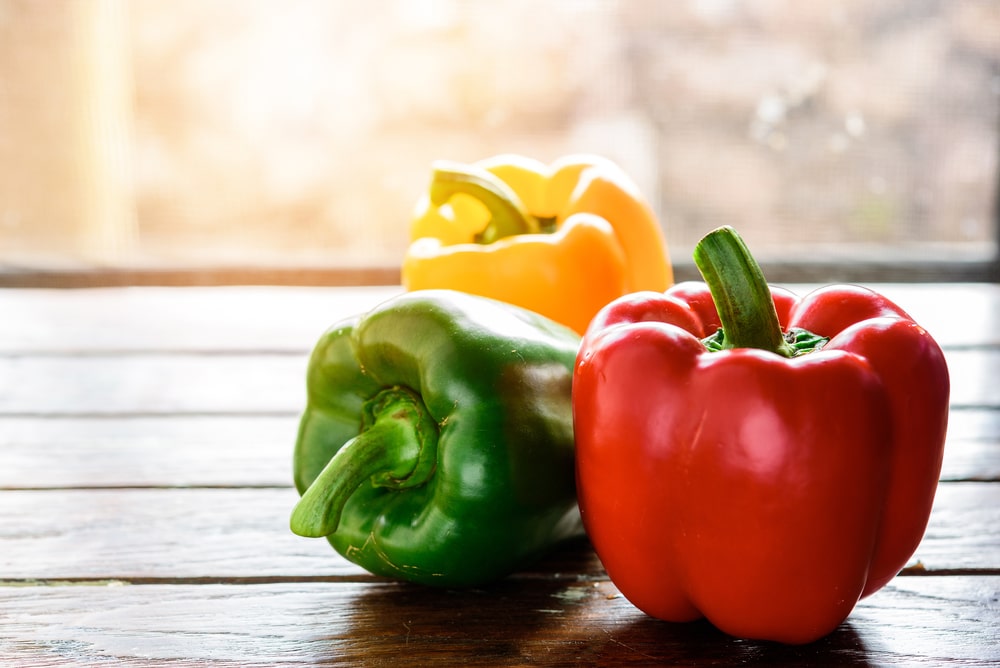Bell peppers, also known as sweet peppers or capsicums, come in at least three different colors: red, green, and yellow. Choosing between red, green, or yellow bell peppers is often a personal preference since all provide similar nutritional value. These crispy vegetables are popular worldwide with a mild flavor and crisp texture that complements most cuisines.
Get your personalized
meal plan!
Peppers contain several important nutrients, such as dietary fiber, vitamin C, and potassium. Many of the nutrients found in bell peppers have considerable antioxidant benefits to improve overall health.
In this article, we investigate the nutrition and health benefits of bell peppers, as well as any risks associated with eating them.
Bell Peppers Nutrition Profile
Fresh, raw bell peppers are mainly composed of water (92%). The main nutrients in 100 grams of raw, red bell peppers are (7):
- Calories: 26
- Water: 92 grams
- Protein: 1 gram
- Carbs: 6 grams
- Sugar: 4.2 grams
- Fiber: 2.1 grams
- Fat: 0.3 grams
The main reason bell peppers provide such great nutritional value is due to their high vitamin C content, which accounts for over 95% of the daily recommended intake. Vitamin C has powerful anti-aging benefits by fighting against oxidation and supporting collagen formation (10).
Vitamin C is a natural antioxidant and free radical fighter that prevents damage to cells and allows them to repair efficiently (12). This may help reduce inflammation and lessen joint pain, helping those suffering from arthritis or osteoarthritis (14).
Bell peppers also contain essential minerals like magnesium that promote healthy teeth as well as potassium that helps our muscles function properly. Potassium lowers blood pressure levels by removing excess sodium from the kidneys, allowing for better fluid balance in the body while reducing strain on our heart (4).
Another major nutrient in bell peppers is dietary fiber. Dietary fiber has a wide range of benefits from improving heart health to promoting a healthy weight and maintaining gut health (6).
Read More: Are Green Peppers Good For You? 6 Reasons And Different Ways To Eat This Vegetable
What Is The Difference Between Green, Yellow, And Red Bell Peppers?
The color of bell peppers can vary from green to red and everything in between. These “capsicums” are all the same species but different cultivars. Green bell peppers are unripe and will eventually ripen to yellow or red if left on the plant long enough. It is important to note that different colored peppers contain different amounts of vitamin A and C (3). Each color has a slightly different taste, so let’s take a look at the differences between green, yellow, and red bell peppers.
Green Bell Peppers
Green bells are perhaps the most versatile of all the bell peppers and the most common. Green peppers are harvested when they’re green and unripe, which stops their natural sugars from continuing to develop. In addition, the chlorophyll in them develops a slightly bitter taste if left on the vine too long.
The flavor is crisp and light with a subtle sweetness; try pairing them with vinegar for salads! They also work great as appetizers: stuff green bells with your favorite dip or a mix of grated cheese and spices.
Yellow Peppers
Yellow bell peppers are harvested while they’re still a yellow-green color. They’re also unripe but sweet and mild enough to be enjoyed raw in salads or cut up as a garnish for tacos! The bright color can add some depth to light-colored dishes, too. Try grilling them with onions and serving on top of smoked turkey at your next barbecue.
Red Bell Peppers
Red bells are the sweetest of all three colors because they’ve stored up more sugar than their green and yellow counterparts during ripening time. These house delicacies don’t keep long once plucked from the vine. Enjoy them while they’re fresh! They are best in cooked dishes for this reason. Frying or sauteing red bells is a great way to preserve them for future snacks and meals.
Reasons why BetterMe is a safe bet: a wide range of calorie-blasting workouts, finger-licking recipes, 24/7 support, challenges that’ll keep you on your best game, and that just scratches the surface! Start using our app and watch the magic happen.
Health Benefits Of Bell Peppers
Due to their nutritional profile, these vegetables offer the following nutritional benefits:
Better Vision
Due to their high vitamin C content, bell peppers can help improve our eyesight. Vitamin C is an antioxidant that helps improve the elasticity of the blood vessels in our eyes and reduce damage from free radicals, which prevent vision problems like glaucoma and cataracts (13). Bell peppers also contain beta carotene, which is converted to vitamin A – an essential nutrient for eye function.
Reduces Inflammation
Bell peppers contain several antioxidants that fight inflammation throughout the body, making them great for those with arthritis or similar joint pains (2). Reducing inflammation also allows more flexibility by keeping joints lubricated and more comfortable.
Weight Loss
The fiber found in bell peppers fills you up without requiring as much food consumption as other foods do. This keeps your stomach feeling full while limiting calorie intake, so you lose weight faster. Fiber also makes digestion easier, preventing bloating and constipation (6).
Electrolyte Balance
The potassium found in bell peppers helps remove excess sodium from the body, allowing for more efficient muscle function throughout the body (4). This can help prevent fluid retention and high blood pressure.
Improved Mood
Increasing your intake of vitamin B6 can help improve mood by stabilizing hormones that govern emotional well-being, sleep cycles, energy levels, memory, and more. Research links low levels of vitamin B6 to depression symptoms (11). Vitamin B6 is often found in foods such as bell peppers, fish (salmon and tuna), and chicken thighs.
Increased Metabolism And Fat Burn
Bell peppers contain a range of nutrients that help boost metabolism, so the body produces more heat from digesting food. This helps burn off calories at a faster rate. Additionally, bell peppers help reduce cravings by keeping your stomach feeling full for longer periods.
Reduced Risk Of Disease
Beta carotene and vitamin C found in bell peppers are both powerful antioxidants that fight the free radicals which contribute to many diseases.
Less IBS Pain
Fiber can help improve gut health by feeding good bacteria while starving bad bacteria, which makes diarrhea caused by IBS less common (5).
Reduced Cravings
Bell peppers are high in fiber which helps keep you feeling full for longer periods, reducing cravings for unhealthy, calorie-dense foods that can easily lead to weight gain.
Read More: Are Sweet Peppers Good For You? Nutrition And Health Benefits Of These Colorful Vegetables
Risks Of Eating Bell Peppers
The main concern of eating bell peppers for those who have a known or unknown allergy to them is that it can cause anaphylaxis – a condition where the body’s immune system overreacts to a particular allergen (1). Symptoms commonly include swelling in the throat area and lightheadedness, which can lead to passing out or even death if not treated immediately.
Best Ways To Eat Bell Peppers
Because these vegetables are extremely versatile, you can eat them in many ways, including:
Pureed
If you do not like eating bell peppers whole but still want the nutritional benefits they provide in each bite, you can puree them into soups or sauces such as this simple white bean soup flavored with rosemary and thyme. You can also blend them to make savory dips for healthy snacking.
Raw Slices In Salads
If you are looking for a light, easy meal to add to your diet, consider making a bell pepper salad with chopped-up slices of full-fat cheese and lean chicken. The flavors of the foods complement one another while providing plenty of flavor without using unhealthy dressings or oils. Remember such oils contain saturated fats, and when consumed in excess are bad for your health (8).
Roasted
For a simple side dish that is healthy and delicious, dice some red or yellow bell peppers into cubes, then roast them in the oven until they have browned slightly. Serve warm alongside roasted meats and your choice of starch.
Grilled
Grilling bell peppers is an easy way to make quick snacks on nights when you don’t feel like cooking too much but still want something tasty and fresh. Keep it simple by seasoning your bell pepper slices with salt and pepper, then grilling them alongside meats such as steak or chicken breasts.
Stir Fry
Bell peppers can be used as a staple of many stir-fry recipes. Because they are crunchy and have a mild flavor, you can use them as the main ingredient without needing to worry about whether or not other ingredients will overpower their taste. Try chopping some up for this simple Asian Chicken Stir Fry made with low-sodium soy sauce and kale. High consumption of sodium increases your risk of hypertension (9).
Stuffed
Bell peppers can be used in place of traditional taco shells or burrito tortillas to create a healthier meal that is just as easy to prepare and enjoy. Simply cut off the tops and seeds, then stuff them with your choice of ground meat, black beans, shredded cheese, and salsa for a quick weeknight dinner without any extra hassle.
Dried And Powdered
Another way to eat bell peppers is by drying them out in the sun or using a dehydrator then pulverizing them into powder form. You can add this to any dish you like, whether it’s intended for sweet dishes like baked goods or savory meals such as meats.
The Bottom Line
Bell peppers are low in calories, yet contain many key nutrients including vitamin A, C, K1, potassium, beta-carotene, lutein/zeaxanthin, which can all benefit overall health. They are also versatile in their flavors, making them easy to incorporate into your daily diet.
DISCLAIMER:
This article is intended for general informational purposes only and does not address individual circumstances. It is not a substitute for professional advice or help and should not be relied on to make decisions of any kind. Any action you take upon the information presented in this article is strictly at your own risk and responsibility!
SOURCES:
- Anaphylactic reaction to bell pepper (Capsicum annuum) in a patient with a latex-fruit syndrome | Allergologia et Immunopathologia (2014, elsevier.es)
- Antioxidant and anti-inflammatory properties of Capsicum baccatum: from traditional use to scientific approach (2012, pubmed.ncbi.nlm.nih.gov)
- Ascorbic Acid and Provitamin A Contents in Unusually Colored Bell Peppers (Capsicum annuumL.) (1997, sciencedirect.com)
- Electrolytes – StatPearls (2021, ncbi.nlm.nih.gov)
- Fiber and Prebiotics: Mechanisms and Health Benefits (2013, mdpi.com)
- Health benefits of dietary fiber | Nutrition Reviews | Oxford Academic (2009, academic.oup.com)
- Peppers, sweet, red, raw (2019, fdc.nal.usda.gov)
- Saturated Fats and Health: A Reassessment and Proposal for Food-Based Recommendations: JACC State-of-the-Art Review (2020, sciencedirect.com)
- Sodium Intake and Hypertension (2019, mdpi.com)
- The Roles of Vitamin C in Skin Health (2017, ncbi.nlm.nih.gov)
- Vitamin B6 level is associated with symptoms of depression (2004, pubmed.ncbi.nlm.nih.gov)
- Vitamin C as an antioxidant: evaluation of its role in disease prevention (2003, pubmed.ncbi.nlm.nih.gov)
- Vitamin C – Health Professional Fact Sheet (2021, ods.od.nih.gov)
- Vitamin C May Help to Reduce the Knee’s Arthritic Symptoms. Outcomes Assessment of Nutriceutical Therapy (2019, ncbi.nlm.nih.gov)
- β-Carotene Is an Important Vitamin A Source for Humans (2010, academic.oup.com)












